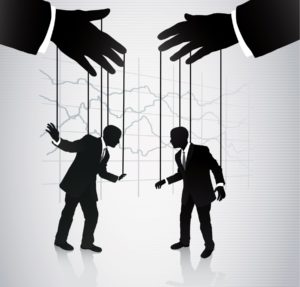…and absolute power corrupts absolutely – to paraphrase the oft quoted Lord Acton, nineteenth century British historian and Member of Parliament.  In fact he said ‘Power tends to corrupt…’ in a letter to Mandell Creighton in 1887. One of my other favourite ‘power’ quotes is from Abraham Lincoln ‘Nearly all men can stand adversity, but if you want to test a man’s character, give him power.’
In fact he said ‘Power tends to corrupt…’ in a letter to Mandell Creighton in 1887. One of my other favourite ‘power’ quotes is from Abraham Lincoln ‘Nearly all men can stand adversity, but if you want to test a man’s character, give him power.’
There are plenty of studies into human behaviour when it comes to power, most famously the ‘Prison experiment‘ at Stanford University, which had to be stopped when those students who were acting as ‘prison guards’ began abusing those students who were ‘prisoners’. More recently there is a study to be found in the Journal of Applied Psychology, by Professor Katherine DeCelles (University of Toronto) which suggests that power doesn’t impact on all people in the same way.
The question DeCelles asks is, if you give ‘good’ people power, are they more able than others “to enact that moral identity, to do what’s right?” The study found that people’s sense of “moral identity”—the degree to which they thought it was  important to their sense of self to be “caring,” “compassionate,” “fair,” “generous” and so on—shaped their responses to feelings of power. You can read the details of the experiment here.
important to their sense of self to be “caring,” “compassionate,” “fair,” “generous” and so on—shaped their responses to feelings of power. You can read the details of the experiment here.
The results showed that power doesn’t automatically corrupt and doesn’t do so equally; it heightens pre-existing ethical tendencies. But other studies suggest that, although people more predisposed to behaving ethically begin by not enriching themselves at the expense of the public purse, even they will succumb over time. The University of Lausanne used the ‘Dictator Game’ to measure people’s propensity to reward themselves at the cost of others. They also took saliva swabs from subjects at different points in the game and found an increase in levels of testosterone and its by-products, in both men and women, and raised levels of dopamine, the brain’s reward system; thus people felt pleasure when they wielded power. Power really does act like a drug. You can read about this study here.
Professor John Antonakis concluded ‘The results were clear. Power corrupts. When given more followers and more choices, the leader was more likely to make an anti social decision. We think strong governance mechanisms and strong institutions are the key to keeping leaders in check,’ he added. ‘Organisations should limit how much leaders can drink from the seductive chalice of power.’ Which rather brings us back to the premise behind Term Limits, the political thriller by Steve Powell mentioned in Monday’s post.
the leader was more likely to make an anti social decision. We think strong governance mechanisms and strong institutions are the key to keeping leaders in check,’ he added. ‘Organisations should limit how much leaders can drink from the seductive chalice of power.’ Which rather brings us back to the premise behind Term Limits, the political thriller by Steve Powell mentioned in Monday’s post.
It seems that Ol’ Abe knew a thing or two about power.
It would be fascinating to get a psychologist’s take on this and to understand the brain science. It prompted me to all sorts of speculation. Could there be a future world in which, in the absence of the governance measures and limits on power referred to by Antonakis, which are too easy to dismantle or circumvent, our leaders are chemically inhibited from feeling the dopamine rush produced by power? A foregoing of pleasure in order to serve? If the use of power was a duty and responsibility rather than a pleasure and an opportunity for self-enrichment I suspect the duration would be self-limited. Now that would be an interesting proposition ( and novel ).
If you want to read more try Facebook Ads – No Politics Criminal Proceedings The Demagogue’s Handbook The Demagogue’s Dictionary


 RSS – Posts
RSS – Posts